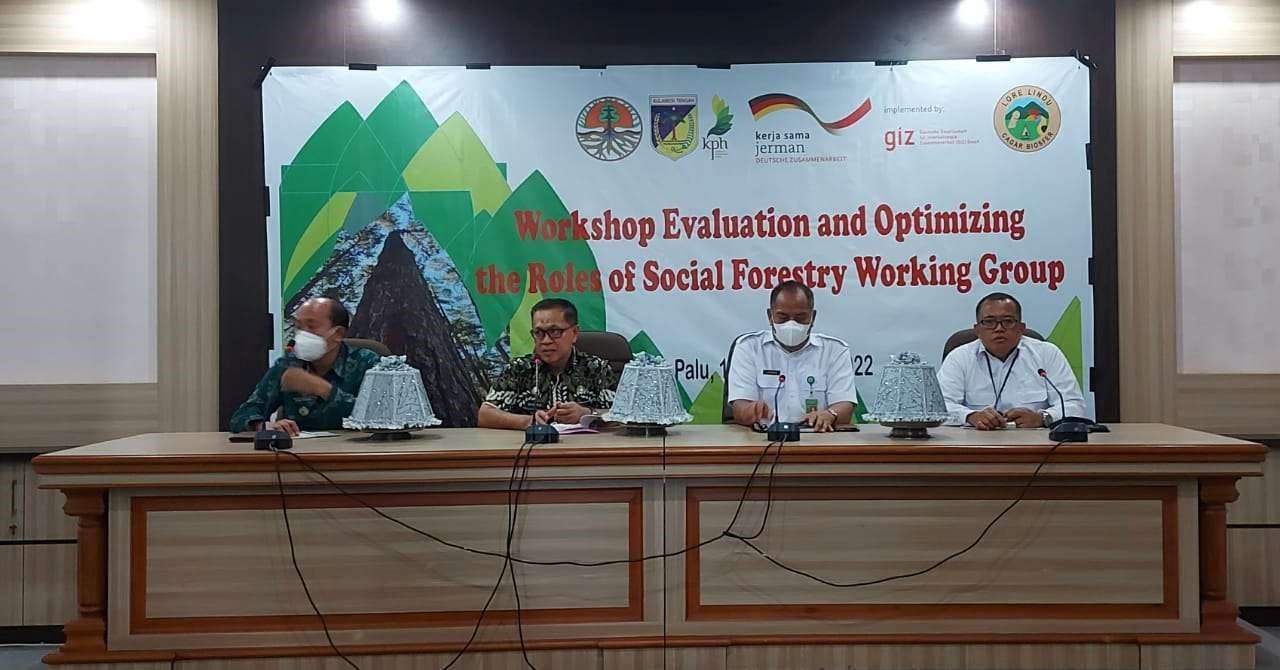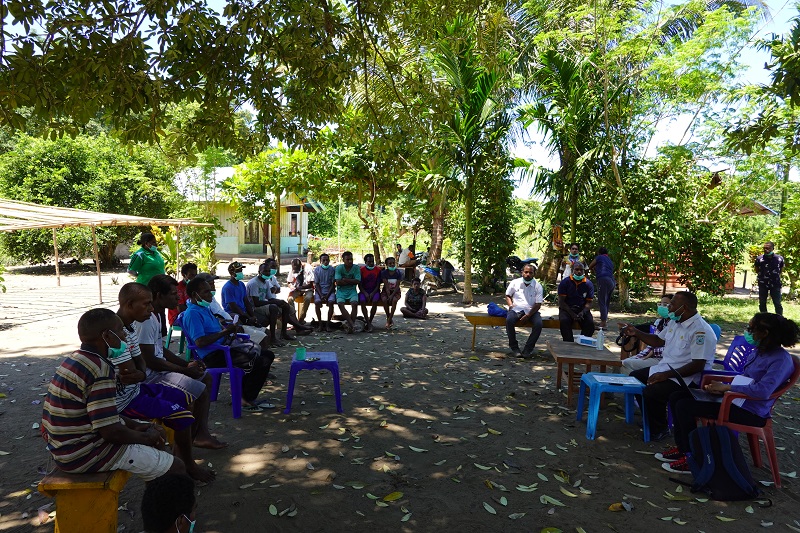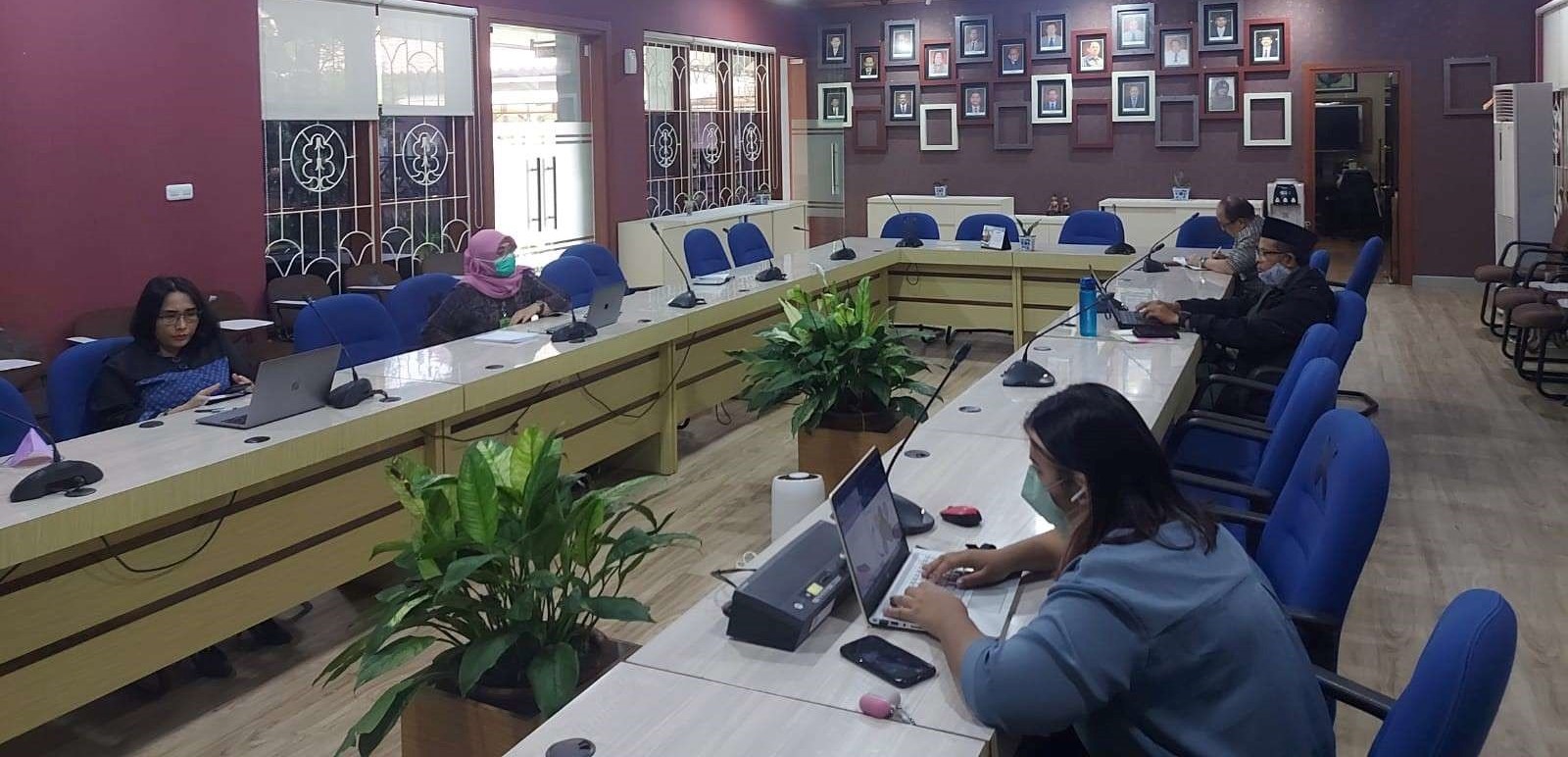FORCLIME
Forests and Climate Change ProgrammeTechnical Cooperation (TC Module)

Select your language

After almost two years of inactivity, the Central Sulawesi Social Forestry Working Group (Pokja PS) held a coordinating Workshop on the Evaluation and Optimization of the Role of the Social Forestry Working Group on 13 - 14 January 2022 in Palu, Central Sulawesi. The meeting, which was initiated by the Central Sulawesi Forestry Service and supported by FORCLIME, aimed to evaluate and optimize the role of Pokja PS in an effort to accelerate the achievements of various social forestry programmes that are being implemented across Central Sulawesi. The meeting, which was opened by the Head of the Forestry Service, Dr Ir. H. Nahardi, MM, IPU, also discussed the work programme of the Social Forestry Working Group (PS) and its implementation.
The meeting proved to be surprisingly dynamic after almost two years without any coordination and various topics were discussed including the following:
1. The importance of the role of social forestry (PS) in relation to the handling of tenure conflicts.
2. Pokja PS’s Business Development Division and a Mentoring Division, which are important bodies that require knowledge of the physical conditions of locations in order to facilitate communities.
3. Pokja PS is not only used as a means of access but also as a communication tool.
4. The need to create an information system and report or evaluate PS Pokja through various applications.
5. Mutual understanding between social forestry groups will be required in order to accelerate the development of social forestry group (KPS) businesses.
6. In the future, Pokja will address the implementation of empowerment and is expected to contribute to reducing poverty rates within the community in line with a directive issued by the Governor of Central Sulawesi.
7. The Center for Social Forestry and Environmental Partnership (BPSKL) is expected to be able to communicate with forest management units (KPH) in relation to mentoring programmes, as well as provide assistance in relation to tools/materials so that they are both appropriate and on target.
The follow-up to this workshop will address the Pokja PS membership for the 2022 - 2023 period; as well as the formulation of an Expert Team that will help to finalize an action plan document that will subsequently be submitted to the Governor; and finally, stakeholder mapping aimed at helping the Social Forestry Working Group achieve its work programmes.
“Synergy, communication, coordination and a clear delineation of roles between the central and local governments and community institutions as regards the management of Social Forestry are very much needed, especially for independent communities working through Pokja PS,” affirmed the Head of Extension for Community Empowerment and Customary Forests at the Forestry Service of Central Sulawesi, Ir. Mohammad Rizal Budjang, MM.
For more information, please contact:
Fikty Aprilinayati, Adviser for Sustainable Forest Management and Biosphere Reserve Management
Ismet Khaeruddin, Senior Advisor for the Biodiversity Focal Point for the KFW Forest Program 3 and Provincial Coordinator for Central Sulawesi

The West Papua Forestry Service, working in conjunction with Production Forest Management Units (KPHP) in Tambrauw and South Sorong, has developed a programme aimed at the empowerment of traditional forest communities (masyarakat hutan adat - MHA) in and around forest areas in order to realize the vision and mission of the conservation province/district of West Papua. The community empowerment programme is being implemented through the social forestry scheme and Forest Farmers Groups (KTH). According to the Head of the Forestry Service, Mr. Runaweri, the traditional forest communities that are currently engaging in activities in forest management unit areas should increase their capacities as regards the management of their organizations, plants and businesses through technical guidance, training, comparative studies and other initiatives. Ultimately, these communities should be able to support sustainable forest management and biodiversity conservation practices across West Papua.
The West Papua Forestry Service recommended that several villages should be analysed more deeply in order to identify their potentials and any need to increase the capacity of KTHs so that they can be synergized with FORCLIME. Field surveys were carried out in 10 villages in November 2021 and these were followed by discussions with the Head of the West Papua Forestry Service in December 2021. Four villages have now been selected, specifically Haha Village in Distrik Saremuk and Wendi Village in Distrik Sawiat in South Sorong Regency; as well as Emmaus Village in Distrik Sausapor and Bikar Village in Distrik Bikar in Tambrauw Regency. These four villages will be targeted for the implementation of joint programmes in conjunction with the West Papua Forestry Service and FORCLIME. Said programmes will focus on activities relating to the development potential of non-timber forest products (NTFPs) and environmental services, the fostering of KTHs and encouraging the implementation of social forestry programmes, including local initiatives that relate to customary forests in the KPHPs of Tambrauw and Sorong Selatan.
Various strategic issues were discussed during the meeting with the Head of the Forestry Service including FORCLIME’s supports for a number of different activities during 2022, such as:
1. Support for the West Papua Forestry Service as regards the dissemination of forestry policies in the wake of the issuance of Law No. 11/2020 on Job Creation, particularly policies that relate to Government Regulation (PP) No. 23/2021 on the Management of Forestry; Regulation of the Minister of Environment and Forestry No. 8/2021 on Forest Management, the Preparation of Forest Management Plans and Forest Utilization in Protection Forests and Production Forests; and Regulation of the Minister of Environment and Forestry No. 9/2021 on Social Forestry Management.
2. Support for the activities of the Acceleration of Social Forestry Working Group in West Papua.
3. Support for FMUs as regards the preparation of a revised long-term forest management plan (RPHJP) document.
4. Support for KTHs within four selected villages regarding institutional management, area management and NTFP business management, including environmental services.
For more information, please contact:
Nita Yohana, Adviser for Sustainable Forest Management and Coordinator for West Papua Province
Mohammad Sidiq, Strategic Area Manager for Sustainable Forest Management and Coordinator for Papua and West Papua Provinces

As part of preparations of their 2022 work plan, FORCLIME and the Environment and Forestry Human Resources Training Center (Pusdiklat SDM LHK) organised a recent initial discussion that addressed human resources (HR) capacity development. This hybrid meeting was held in the Sonokeling Room at Pusdiklat SDM LHK and also via Microsoft Teams on Tuesday, 21 December 2021. The purpose of the discussion was to develop a synergistic and complementary work plan for Pusdiklat SDM LHK. The 2022 FORCLIME work plan will focus on several main activities, including the development of e-learning, the development of electronic modules for KPH HR and capacity building for lecturers (widyaiswara).
At the end of the discussion session, Ms Puji Iswari, the acting of the Head of the Pusdiklat LHK, stated that, “Although FORCLIME’s main focus is currently in eastern Indonesia, we hope that FORCLIME’s capacity building activities will still prove valuable to Pusdiklat LHK so that their benefits can be applied across seven Environmental and Forestry Education and Training Centers and Forestry Vocational High Schools throughout Indonesia.”
A follow-up to this meeting is planned for January 2022, during which Pusdiklat LHK will invite FORCLIME and other partnering institutions to discuss the finalization of the 2022 work plan.
For more information, please contact:
Wira Hakim, Junior Adviser for Human Capacity Development
Edy Marbyanto, Strategic Area Manager for Human Capacity Development
 |
Supported By: |
  |